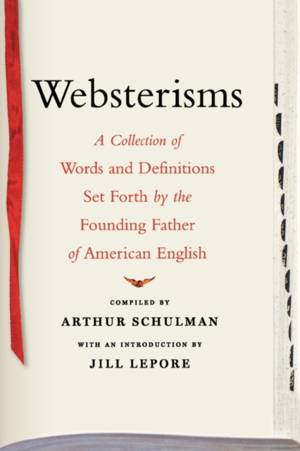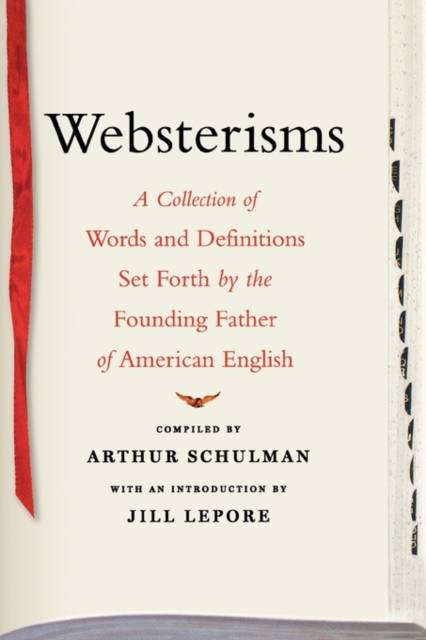
- Afhalen na 1 uur in een winkel met voorraad
- Gratis thuislevering in België vanaf € 30
- Ruim aanbod met 7 miljoen producten
- Afhalen na 1 uur in een winkel met voorraad
- Gratis thuislevering in België vanaf € 30
- Ruim aanbod met 7 miljoen producten
Zoeken
Websterisms
A Collection of Words and Definitions Set Forth by the Founding Father of American English
Paperback | Engels
€ 29,95
+ 59 punten
Omschrijving
"A national language is a national tie, and what country wants it more than America?"
-- Noah Webster What makes American English American? In 1800, irascible patriot Noah Webster set out to answer this question by tirelessly recording the vocabulary of a novel breed -- the American citizen. Though he was a political conservative, his American Dictionary of the English Language was born out of his deeply held and profoundly democratic conviction that language was by and for the people. A word's popularity, no matter how lowly its origins, was its criterion for inclusion. Webster's original American dictionary, the granddaddy of them all, helped define the American character. In a light-footed introductory essay, Harvard historian and New Yorker contributor Jill Lepore brilliantly revives the curmudgeonly Webster: his rigor, his passion for words, and his paradoxical ideas about language and politics. Arthur Schulman, longtime crossword puzzle creator for The New York Times, has culled fifteen hundred of Webster's entries from the original book, revealing Webster's interpretive powers as well as his pervasive moralism. Incisively annotated and delightfully illustrated with quotes from contemporary American sources, these excerpts paint a fascinating picture of a budding Republic. For everyone who's ever gone to "look it up in Webster's" Websterisms offers a crisp new view both of the man justifiably called the Founding Father of American English and of his magnum opus. It took Webster twenty-eight years to compile and publish his monumental work, during which time he was much mocked: what could American English be but a perversion of the King's English? But his dictionary stuck, and its influence grew and grew. We still use most of the words Webster defined, like spank and caucus. Others, like musquash, haven't fared as well. Websterisms tells the tale of a language that once was and that lives on.
-- Noah Webster What makes American English American? In 1800, irascible patriot Noah Webster set out to answer this question by tirelessly recording the vocabulary of a novel breed -- the American citizen. Though he was a political conservative, his American Dictionary of the English Language was born out of his deeply held and profoundly democratic conviction that language was by and for the people. A word's popularity, no matter how lowly its origins, was its criterion for inclusion. Webster's original American dictionary, the granddaddy of them all, helped define the American character. In a light-footed introductory essay, Harvard historian and New Yorker contributor Jill Lepore brilliantly revives the curmudgeonly Webster: his rigor, his passion for words, and his paradoxical ideas about language and politics. Arthur Schulman, longtime crossword puzzle creator for The New York Times, has culled fifteen hundred of Webster's entries from the original book, revealing Webster's interpretive powers as well as his pervasive moralism. Incisively annotated and delightfully illustrated with quotes from contemporary American sources, these excerpts paint a fascinating picture of a budding Republic. For everyone who's ever gone to "look it up in Webster's" Websterisms offers a crisp new view both of the man justifiably called the Founding Father of American English and of his magnum opus. It took Webster twenty-eight years to compile and publish his monumental work, during which time he was much mocked: what could American English be but a perversion of the King's English? But his dictionary stuck, and its influence grew and grew. We still use most of the words Webster defined, like spank and caucus. Others, like musquash, haven't fared as well. Websterisms tells the tale of a language that once was and that lives on.
Specificaties
Betrokkenen
- Illustrator(s):
- Uitgeverij:
Inhoud
- Aantal bladzijden:
- 304
- Taal:
- Engels
Eigenschappen
- Productcode (EAN):
- 9781416577010
- Verschijningsdatum:
- 1/10/2010
- Uitvoering:
- Paperback
- Formaat:
- Trade paperback (VS)
- Afmetingen:
- 152 mm x 229 mm
- Gewicht:
- 367 g

Alleen bij Standaard Boekhandel
+ 59 punten op je klantenkaart van Standaard Boekhandel
Beoordelingen
We publiceren alleen reviews die voldoen aan de voorwaarden voor reviews. Bekijk onze voorwaarden voor reviews.










